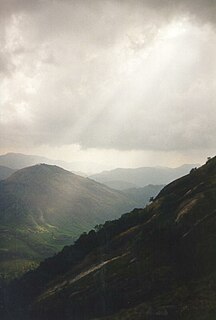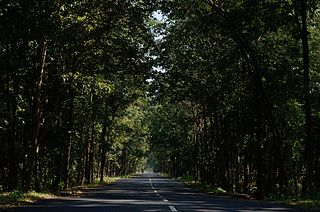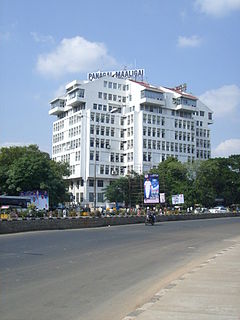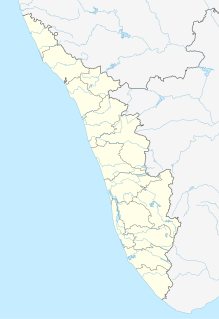
Idukki is one of the 14 districts of Kerala state, India, created on 26 January 1972. At that time, the district headquarters was at Kottayam. In June 1976 it was moved to Painavu. Idukki which lies in the Western Ghats of Kerala. Idukki is the second largest district in area but has the lowest population density. Idukki has a vast forest reserve area; more than a half of the district is covered by forests. The urban areas are densely populated whereas villages are sparsely populated. Idukki is also known as the spice garden of Kerala.
The Canadian Forest Service is a sector of the Canadian government department of Natural Resources Canada. Part of the federal government since 1899, the CFS is a science-based policy organization responsible for promoting the sustainable development of Canada's forests and competitiveness of the forest sector to benefit present and future Canadians. Some of the research areas that the CFS is involved in include; forest fire, climate change, silviculture, soils, insects and disease, remote sensing and forest management. Since 1991 the sector has produced an annual report, The State of the Forest in Canada, which describes the status of the nation's forests and the forest industry.
The All India Services (AIS) comprises Civil Services of India, namely the Indian Administrative Service (IAS), the Indian Forest Service (IFS) and the Indian Police Service (IPS). A common unique feature of the All India Services is that the members of these services are recruited by the Centre, but their services are placed under various State cadres, and they have the liability to serve both under the State and under the Centre. Due to the federal polity of the country, this is considered one of the tools that makes union government stronger than state governments. Officers of these three services comply to the All India Services Rules relating to pay, conduct, leave, various allowances etc.

The Ministry of Environment, Forest and Climate Change (MoEFCC) is an Indian government ministry. The ministry portfolio is currently held by Dr. Harsh Vardhan, Union Minister of Environment, Forest and Climate Change.
Forests in the state of Himachal Pradesh currently cover an area of nearly 37,691 square kilometres (14,553 sq mi), which is about 38.3% of the total land area of the state. The forests were once considered to be the main source of income of the state and most of the original forests were clear felled. The emphasis has shifted, however, from exploitation to conservation. The state government aims to increase forest cover to 50% of the total land area. There have been various projects, including the establishment of protected areas such as National Parks, designed to preserve and expand the forests.

Social forestry means the management and protection of forest and afforestation of barren and deforested lands with the purpose of helping environmental, social and rural development.

A reserved forest or a protected forest in India are terms denoting forests accorded a certain degree of protection. The term was first introduced in the Indian Forest Act, 1927 in British India, to refer to certain forests granted protection under the British crown in British India, but not associated suzerainties. After Indian independence, the Government of India retained the status of the existing reserved and protected forests, as well as incorporating new reserved and protected forests. A large number of forests which came under the jurisdiction of the Government of India during the political integration of India were initially granted such protection.The first Reserve Forest Of India was Satpura National Park.

The Wildlife Institute of India (WII) is an autonomous institution under the Ministry of Environment Forest and Climate change, Government of India. established in May 1982.

The Protected areas of Tamil Nadu State in South India cover an area of 3,305 km2 (1,276 sq mi), constituting 2.54% of the geographic area and 15% of the 22,643 km2 (8,743 sq mi) recorded forest area. It ranks 14th among all the States and Union Territories of India in terms of total protected area.

Forestry in India is a significant rural industry and a major environmental resource. India is one of the ten most forest-rich countries of the world along with Russia, Brazil, Canada, United States of America, China, Democratic Republic of the Congo, Australia, Indonesia and Sudan. Together, India and these countries account for 67 percent of total forest area of the world. India's forest cover grew at 0.20% annually over 1990-2000, and has grown at the rate of 0.7% per year over 2000-2010, after decades where forest degradation was a matter of serious concern.

Forest Survey of India (FSI), founded in June 1981 and headquartered at Dehradun in Uttarakhand, is a Government of India Ministry of Environment, Forest and Climate Change organisation for conducting forest surveys, studies and research to periodically monitor the changing situation of land and forest resources and present the data for national planning, conservation and sustainable management of environmental protection as well for the implementation of social forestry projects.

Pampadum Shola National Park is the smallest national park in Kerala state, South India. The park is administered by the Kerala Department of Forests and Wildlife, Munnar Wildlife Division, together with the nearby Mathikettan Shola National Park, Eravikulam National Park, Anamudi Shola National Park, Chinnar Wildlife Sanctuary and the Kurinjimala Sanctuary. The park adjoins the Allinagaram Reserved Forest within the proposed Palani Hills Wildlife Sanctuary and National Park.It is a part of Palani hills stretched up to Vandaravu peak.The Westerns Ghats, Anamalai Sub-Cluster, including these parks, is under consideration by the UNESCO World Heritage Committee for selection as a World Heritage Site.

One of Bhutan's significant natural resources in the late twentieth century was its rich forests and natural vegetation. Bhutan's location in the eastern Himalayas, with its subtropical plains and alpine terrain, gives it more rainfall than its neighbors to the west, a factor greatly facilitating forest growth. The forests contain numerous deciduous and evergreen species, ranging from tropical hardwoods to predominantly oak and pine forests.

The Kerala Forest Research Institute (KFRI) is an organisation based in Peechi, in Thrissur, India. It was established in 1975 by the Government of Kerala as part of its Science and Technology Department, and in 2003 became part of the Kerala State Council for Science, Technology and Environment.
Kerala State Council for Science, Technology and Environment (KSCSTE) is an autonomous body constituted by the Government of Kerala in November 2002 to encourage and promote science and technology-related activities in Kerala State. Prior to the establishment of KSCSTE, the body responsible for carrying out similar work was the State Committee for Science, Technology and Environment (STEC) established in 1972. KSCSTE was formed by restructuring STEC in concurrence with the Science Policy of Government of India.

The Tamil Nadu Forest Department was established as the Madras Forest Department in 1855 by Dr Hugh Francis Cleghorn, "the father of scientific forestry in India". The department is responsible for managing all the protected areas and forests plus environmental and wildlife related issues of Tamil Nadu state in South India. The objective of the Tamil Nadu Forest Department is to conserve biodiversity and eco-systems of forests and wilderness areas to ensure water security and food security of the state.
Thrissur Zoological Park Wildlife Conversation & Research Centre, Puthur is an upcoming zoological park situated in Puthur in Thrissur City of Kerala State in India. All zoos in the state of Kerala is presently managed by the Ministry of Cultural Affairs and this will be the first zoo in the state which will be developed and managed by the Department of Forests and Wildlife (Kerala).











